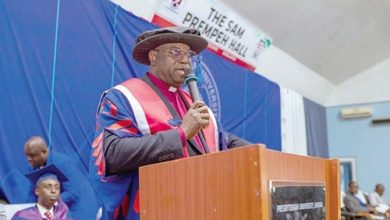Crisis-hit as Nigerian university students are ordered to leave UK
Abtvgh / BBC
Nigerian students have been thrown off university courses and ordered to leave the UK after a currency crisis left them struggling to pay tuition fees on time.
Teesside University students were blocked from their studies and reported to the Home Office after the value of Nigeria’s naira plummeted, wiping out their savings.
Some told the BBC they felt suicidal as they accused the university of taking a “heartless” approach to those who fell into arrears as a consequence.
A university spokesman said failure to pay was a breach of visa sponsorship requirements, and that it had “no choice” but to alert the Home Office. The Home Office said visa sponsorship decisions rested with the institution.
Nigeria is currently experiencing its worst economic crisis in a generation, which is having a significant impact on Nigerian students at some UK universities.
The annual inflation rate is now almost 34%, partly driven by President Bola Tinubu’s dropping of a fuel subsidy last year that put up petrol and diesel prices and which has filtered through into the cost of other goods.
The government has also stopped trying to support the value of the naira on the currency market and it has depreciated in the past 12 months by more than 200% against the dollar.
Before beginning their studies at Teesside, affected students were told they had to show proof of having enough funds to pay tuition fees and living expenses.
However, those funds were significantly depleted as a result of the crisis in their home country.
This exacerbated financial problems already being experienced by students as a result of the university changing tuition fee payment plans from seven instalments to three.
A group of students, 60 of whom shared their names with the BBC, began pressing the university for support after a number of people who defaulted on payments were frozen out of university accounts and involuntarily withdrawn from their courses.
Some were reportedly also contacted by debt collection agencies contracted by the university.




